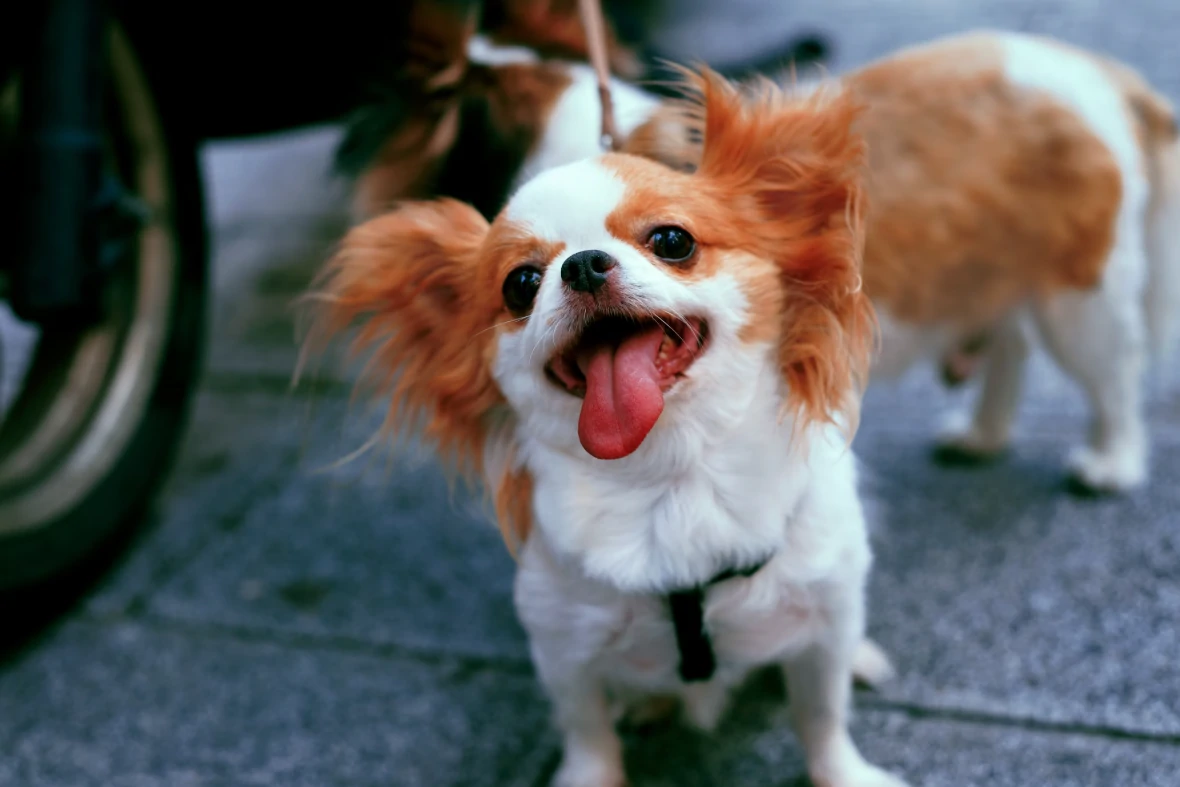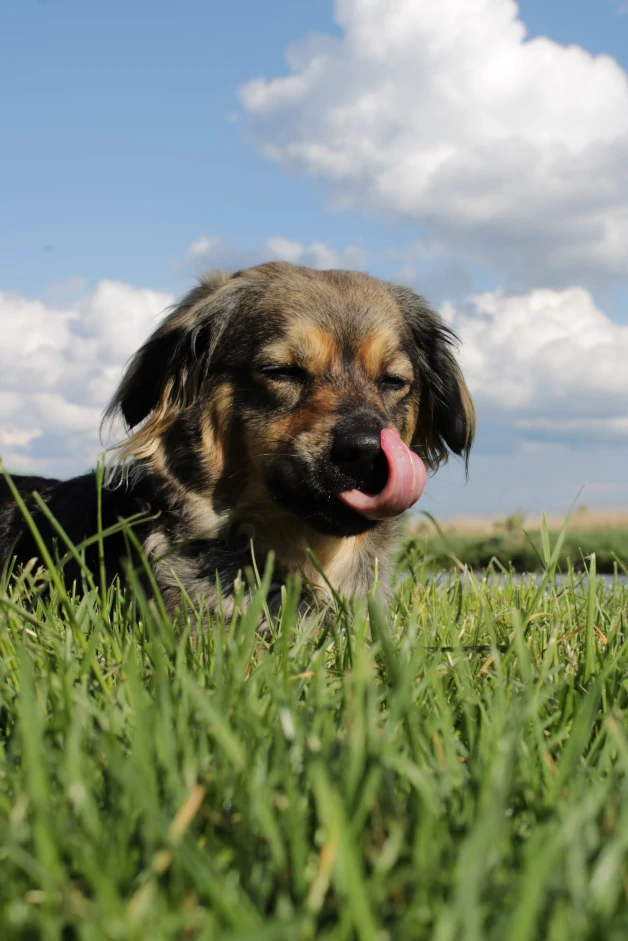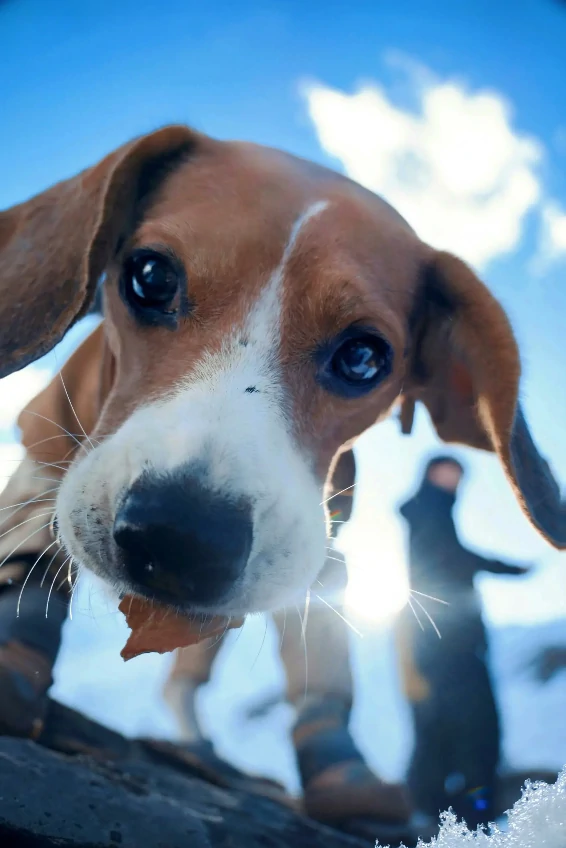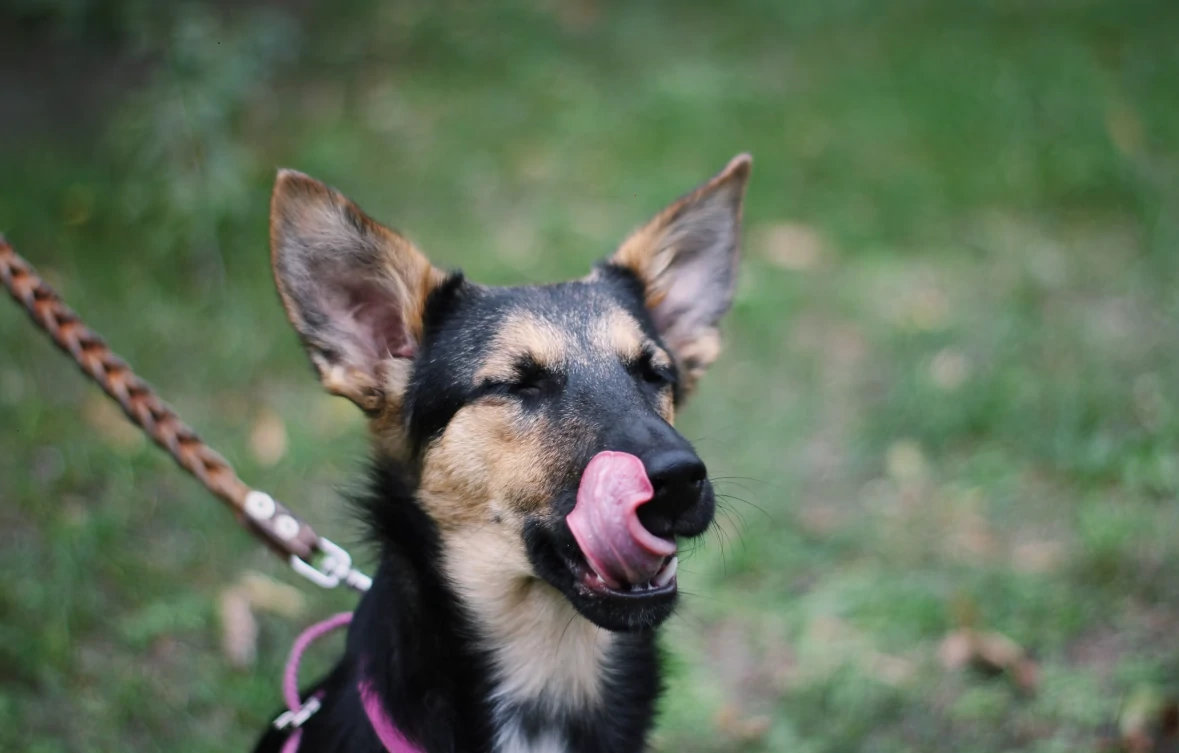Why Does My Dog Keep Sneezing? — Causes, Solutions & When to See a Vet
Is your dog keep sneezing? Find real answers here! Learn the common causes, crucial warning signs, and practical tips to help your furry friend.

Table of Contents
Hearing your beloved canine companion sneeze once or twice is typically no cause for alarm. A quick “Achoo!” can be a perfectly normal reaction to a speck of dust, a tickle in the nose, or even an expression of playful excitement. But what if your dog keep sneezing? When that occasional sneeze turns into persistent bouts, or you observe that dog keep sneezing all the time, it’s understandable to feel a pang of worry. Is it just a passing irritation, or is something more serious going on?
Understanding why your dog is experiencing consistent sneezing is a common concern for many pet parents across Europe and the United States. While often benign, continuous dog keep sneezing can sometimes signal an underlying health issue that requires attention. This article aims to equip you with the knowledge to identify the potential causes behind your dog’s frequent sneezes, understand when it’s time to seek professional help, and learn what you can do to help your furry friend feel more comfortable. Let’s dive in to decipher what your dog’s nose might be trying to tell you.
Is It Normal for Dogs to Sneeze?
Just like humans, dogs sneeze. It’s a natural, involuntary reflex designed to expel irritants from the nasal passages. An isolated sneeze from your dog is usually nothing to worry about. They might have inhaled a bit of dust, a stray hair, or perhaps felt a tickle from a sudden scent. This type of sneezing is brief and has no accompanying symptoms.
You might also observe dog sneezing during moments of intense excitement or play. Sometimes referred to as “play sneezes,” these are typically short, sharp exhalations often accompanied by tail wags, play bows, or zoomies. It’s thought to be a way for dogs to communicate their playful intentions or release excess energy. This is a common and harmless part of canine communication.
So, what constitutes “too much sneezing”? There’s no magic number, but if your dog keep sneezing frequently throughout the day, if the sneezes are very forceful, if they seem uncomfortable, or if they continue sneezing alongside other concerning symptoms, then it’s time to pay closer attention. A consistent pattern of sneezing suggests an ongoing irritation or problem that needs investigating.
What Are Some Common Reasons Your Dog Keep Sneezing?
When your dog keep sneezing, it’s usually their body’s way of reacting to an irritant or an underlying health condition. Identifying the specific cause is the first step toward finding a solution. Here are some of the most common reasons you might find your dog keep sneezing or your dog constantly sneezing:

Environmental Irritants
One of the most frequent culprits behind a dog constantly sneezing scenario is simply something in their immediate environment. Dogs, with their highly sensitive noses, are constantly exploring the world through scent. This can lead to them inhaling particles that trigger a sneeze reflex.
- Dust and Dirt: Common household dust, or dust kicked up during outdoor adventures, can easily irritate a dog’s nasal passages. If your dog is sneezing a lot after you clean or if they’ve been digging, dust is a likely suspect. Regular cleaning can help manage airborne irritants that make your dog keep sneezing.
- Pollen: Just like humans, dogs can suffer from seasonal allergies caused by airborne pollen from trees, grasses, and weeds. While dogs often manifest allergies with skin itchiness, nasal irritation leading to sneezing can also occur. If your dog is sneezing a lot only during specific seasons, it might be an allergic reaction.
- Smoke:Cigarette smoke, fireplace smoke, or even fumes from cooking can be highly irritating to a dog’s respiratory system. Avoid smoking around your pet and ensure good ventilation if your dog keep sneezing after exposure.
- Strong Scents and Chemicals: Air fresheners, perfumes, scented candles, cleaning products, and even certain pet shampoos can contain chemicals or strong fragrances that irritate sensitive canine noses. If your dog keep sneezing after a grooming session or cleaning, consider the products you’re using.
Seasonal Allergies
While not as common for sneezing as skin issues, environmental allergens can certainly cause your dog to sneeze during specific times of the year. If your dog is sneezing a lot only during spring or fall, alongside other symptoms like itchy skin, watery eyes, or paw licking, seasonal allergies could be the cause. An exposure to specific pollens can lead to the nasal passages becoming inflamed and irritated, resulting in frequent sneezing. Knowing if your dog keep sneezing in specific seasons can help narrow down the cause.
Kennel Cough or Upper Respiratory Infections
When a dog keep sneezing and it’s accompanied by other symptoms like a cough, nasal discharge, or lethargy, an infection is a strong possibility.
- Kennel Cough: More formally known as canine infectious tracheobronchitis, kennel cough is a highly contagious respiratory disease. It’s caused by a variety of airborne bacteria and viruses and often results in a harsh, dry, hacking cough that can sound like a goose honking. While coughing is the primary symptom, dog sneezing a lot and nasal discharge can also be present, especially in the early stages or in conjunction with other respiratory pathogens. Dogs often contract it after exposure to other dogs in places like boarding kennels, dog parks, or training classes, causing them to dog constantly sneezing.
- These can be caused by various viruses or bacteria, leading to inflammation of the nasal passages, throat, and trachea. Symptoms commonly include dog constantly sneezing, nasal discharge (clear, yellowish, or green), watery eyes, and sometimes a cough, lethargy, or decreased appetite.
Foreign Objects Stuck in the Nose
Dogs are naturally curious and explore the world head-first, often sniffing around in grass, bushes, or dirt. This makes them prone to inhaling small foreign objects that can get lodged in their nasal passages. Common culprits include:
- Grass Awns/Seeds: These tiny, barbed plant materials can easily get inhaled and become painfully stuck, causing sudden, violent bouts of dog sneezing, pawing at the face, and sometimes a bloody or discolored discharge from one nostril. If your dog keep sneezing suddenly after being outdoors, consider this possibility.
- Small Bits of Dirt or Debris: While usually sneezed out, sometimes a piece can remain, causing persistent irritation.
- Insects: A small insect crawling into the nostril can also cause intense dog constantly sneezing.
If you suspect a foreign object, especially if the sneezing is sudden, intense, and affecting only one nostril, it’s a strong indication for immediate veterinary attention.

Dental Issues Affecting Nasal Passages
Believe it or not, dental problems can sometimes manifest as a dog keep sneezing. The roots of a dog’s upper teeth are very close to their nasal passages. A severe tooth root abscess or advanced periodontal disease can lead to an infection that erodes the bone between the mouth and the nasal cavity, creating an opening (oro-nasal fistula). This can allow bacteria and food particles to enter the nasal passages, causing chronic nasal discharge, dog sneezing a lot, and sometimes even bleeding from the nose. This is particularly common in older dogs with poor dental hygiene. If your dog keep sneezing and has poor dental health, this might be a link.
Breed-Specific Traits (e.g., Flat-Faced Breeds Sneeze More)
Some breeds are predisposed to more frequent sneezing due to their unique anatomy. Brachycephalic breeds (dogs with flattened faces and short snouts) like Pugs, French Bulldogs, Boston Terriers, and Boxers often experience more frequent dog sneezing and snorting due to their compacted facial structures. Their narrower nostrils and elongated soft palates can restrict airflow, making them more prone to nasal irritation and reverse sneezing. While this is often a normal part of their breed, significant changes should still be checked by a vet, especially if your dog keep sneezing suddenly more than usual.
When to Worry: Red Flags to Watch For
While an occasional sneeze is benign, there are definite red flags that should prompt a call to your veterinarian if your my dog keep sneezing or your dog is sneezing a lot. These accompanying symptoms indicate that the sneezing is part of a larger problem requiring professional diagnosis and treatment:
- Nasal Discharge (Beyond Clear):
- Clear, watery discharge: Might indicate allergies or mild irritation, but persistent clear discharge should still be noted, especially if your dog keep sneezing consistently.
- Yellow, green, or thick discharge: A strong indicator of a bacterial infection. This pus-like discharge suggests the body is fighting off an infection.
- Bloody discharge: Any presence of blood in the nasal discharge is a serious red flag. It can be due to a foreign object, severe infection, trauma, clotting disorders, or, rarely, a tumor. This warrants immediate veterinary attention if your dog keep sneezing and you see blood.

- Sneezing with Coughing or Wheezing: If my dog keep sneezing and also develops a cough, it points to a broader respiratory issue, such as kennel cough, bronchitis, pneumonia, or even heart disease, especially if the cough is wet or accompanied by difficulty breathing. Wheezing indicates constricted airways and is always a concern.
- Swelling or Facial Discomfort: If you notice swelling around your dog’s nose, eyes, or face, or if they are pawing at their face excessively, it could suggest a foreign object lodged deep in the nasal passage, a severe infection, or even a dental abscess impacting the nasal cavity. This is a critical sign if your dog is sneezing a lot.
- Loss of Appetite or Energy: When a dog is sneezing a lot and also shows signs of systemic illness like lethargy, decreased interest in food or water, or general malaise, it signals that the underlying cause is significantly impacting their overall health. This should always be taken seriously.
- Sneezing All the Time with No Clear Cause: If your dog is sneezing all the time frequently and persistently for days, but you can’t identify any obvious irritant or accompanying symptoms, it’s still best to consult your vet. Chronic unexplained sneezing suggests there’s an underlying issue that isn’t resolving on its own.
What to Do If Your Dog Is Sneezing Constantly
If you find your dog constantly sneezing or your dog sneezing all the time, there are immediate steps you can take at home to provide some comfort and potentially identify the cause, while also knowing when to seek professional help.
Remove Potential Irritants at Home
Your first line of defense is to make your home environment as sneeze-free as possible if your dog keep sneezing due to irritants.
- Dust Control: Regularly vacuum (preferably with a HEPA filter) and dust surfaces to minimize airborne particles.
- Avoid Strong Scents: Refrain from using aerosol sprays, air fresheners, scented candles, strong cleaning products, or perfumes around your dog. Their sensitive noses can react strongly to these. Opt for unscented, pet-safe alternatives.
- No Smoking: If you smoke, do so outdoors, away from your pet, as secondhand smoke is highly irritating and detrimental to their respiratory health.
Use an Air Purifier
Consider investing in a high-quality air purifier with a HEPA filter. Placing it in the room where your dog spends most of its time can significantly reduce airborne allergens and irritants like dust, pollen, and pet dander, which might be contributing to your dog constantly sneezing. This can be a simple, yet effective solution if environmental factors are at play, helping your dog keep sneezing less frequently.
Monitor and Record Symptoms
Keep a detailed log of your dog’s sneezing. Note:
- Frequency: How often are they sneezing? Is it consistent, or are there specific times of day?
- Severity: Are they just little sneezes or forceful, explosive bouts?
- Type of Discharge: Is it clear, white, yellow, green, or bloody? Is it from one nostril or both?
- Accompanying Symptoms: Are they also coughing, wheezing, rubbing their face, showing lethargy, or refusing to eat?
- Triggers: Does it happen after specific activities (e.g., walk in the park, waking up, eating)?
This information will be incredibly valuable to your veterinarian during diagnosis if your dog keep sneezing consistently.
Clean Bedding and Toys Regularly
Dust mites and allergens can accumulate in your dog’s bedding and favorite toys. Wash these items frequently in hot water to minimize their presence and reduce potential environmental allergens that could cause your dog sneezing all the time. A clean environment contributes significantly to reducing sneezing episodes.

When to Consult a Veterinarian
While these home measures can help, they are not a substitute for professional veterinary care. As outlined in the “When to Worry” section, if your dog constantly sneezing is persistent, severe, or accompanied by any concerning symptoms (discharge, lethargy, loss of appetite, difficulty breathing, facial swelling, or if you suspect a foreign object), contact your veterinarian immediately. It’s always better to be safe and get a professional opinion. Don’t delay if you observe your dog keep sneezing with these red flags.
Veterinary Diagnosis & Treatment Options
When you bring your my dog is sneezing a lot to the vet, they will conduct a thorough examination to pinpoint the cause.
- What Your Vet Might Examine:
- Physical Exam:This includes listening to their heart and lungs, checking lymph nodes, and examining their overall health. This first step helps the vet get a comprehensive picture of why your dog keep sneezing.
- Nasal Exam: The vet will carefully look at your dog’s nostrils and potentially use an otoscope (ear scope) to look further inside the nasal passages if feasible.
- Oral Exam: A thorough check of the mouth and teeth, especially the upper molars and premolars, to identify any dental disease or fistulas that might be contributing to sneezing.
- Palpation: Gently feeling around the nasal bridge and face to check for swelling or pain.
- Sedated Exam/Imaging: If a foreign object or deeper issue is suspected, your vet might recommend sedation to perform a more in-depth oral and nasal examination. They may also suggest imaging techniques like X-rays of the skull or chest, or even more advanced imaging like a CT scan, to visualize the nasal passages, sinuses, and lungs. These diagnostic tools are critical when a dog keep sneezing from an unknown cause.
- Lab Tests: Blood tests can help assess overall health, check for signs of infection or inflammation. Nasal swabs or washes might be taken for culture and sensitivity testing to identify specific bacteria or fungi.
- Medications:
- Antihistamines: If allergies are suspected to be contributing to your dog is sneezing a lot, your vet might prescribe antihistamines to reduce allergic reactions and alleviate sneezing.
- Antibiotics: If a bacterial infection (e.g., secondary to a virus, or a primary bacterial infection like a tooth abscess) is diagnosed, antibiotics will be prescribed.
- Anti-inflammatories: Steroids or other anti-inflammatory medications might be used to reduce swelling and irritation in the nasal passages or airways.
- Antivirals/Antifungals: Depending on the specific pathogen identified causing your dog keep sneezing.
- Allergy Testing: If environmental allergies are strongly suspected, your vet might recommend allergy testing (blood test or intradermal skin test) to identify specific allergens, which can then guide treatment strategies, including desensitization injections, to reduce sneezing episodes.
- Minor Surgical Intervention: For foreign objects lodged deep in the nasal passages that cannot be flushed out, or for nasal polyps or tumors, surgical removal might be necessary. This is often performed using specialized scopes (rhinoscopy) to visualize and retrieve the object or tissue that causes the dog keep sneezing.
Preventing Sneezing in the Future

While you can’t prevent every sneeze, there are proactive steps you can take to reduce the likelihood of your dog keep sneezing due to preventable causes:
- Tips to Reduce Exposure to Allergens and Irritants:
- Regular Cleaning: Keep your home clean and dust-free. Wash pet bedding frequently. This simple step can significantly reduce environmental triggers for sneezing.
- Humidifiers: Maintain optimal humidity in your home, especially during dry seasons, as dry air can irritate nasal passages.
- Avoid Aerosols and Smoke: Eliminate smoking indoors and minimize the use of strong-smelling household products. These can be major irritants that cause your dog keep sneezing.
- Outdoor Awareness: Be mindful of areas with high pollen counts or tall grass that might contain seeds or awns. After outdoor adventures, check your dog’s nose and paws for foreign material. This proactive check can prevent sudden bouts of sneezing.
- Diet & Supplements to Boost Immune Health: A balanced, high-quality diet is fundamental for a strong immune system. Discuss with your vet if any immune-boosting supplements (e.g., omega-3 fatty acids, probiotics) might be beneficial for your dog’s specific needs, especially if they are prone to infections or allergies that cause them to dog keep sneezing.
- Regular Dental Check-ups: Proactive dental care, including regular brushing and professional cleanings as recommended by your vet, can prevent severe dental issues that might impact nasal passages and lead to chronic sneezing.
- Avoiding Dog Parks When Respiratory Illnesses Are Spreading: If there are reports of kennel cough or other respiratory illnesses circulating in your area, consider temporarily avoiding high-traffic dog areas like dog parks, boarding kennels, or crowded doggy daycare facilities to reduce exposure. This can help prevent contagious causes of dog keep sneezing.
Conclusion
Observing your dog keep sneezing can certainly be concerning, but understanding the potential causes is the first step towards helping your furry friend. From harmless irritants to more serious underlying health conditions, paying close attention to the nature of the sneezing and any accompanying symptoms is key. While environmental adjustments and careful monitoring can provide comfort, persistent or worrying sneezing warrants a prompt visit to your veterinarian. Early diagnosis and appropriate treatment are vital for ensuring your dog’s speedy recovery and long-term respiratory health.
Don’t hesitate to take early action when your dog’s sneezing persists or worsens. Your vet is your best resource for keeping your beloved companion healthy and happy. Share this article with fellow dog parents to help them understand this common canine concern, or better yet, speak with your veterinarian if you have any questions about your dog’s health!
Holiday Sale
Up to 60% off
Get your favorite gift box

Latest Articles
Check out our latest articles here
-
Is a Black Cat Christmas Sweater Your Perfect Holiday Look?

A black cat christmas sweater is the perfect holiday look. Find the coziest styles and the best fit for your festive celebrations.
